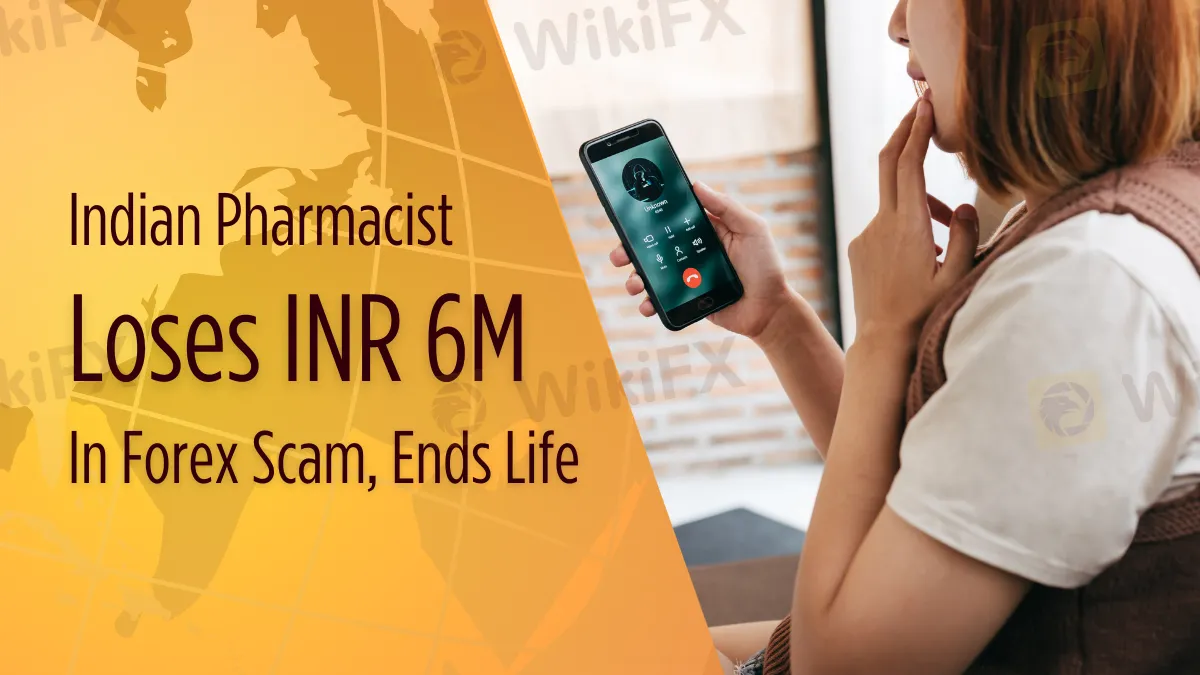简体中文
繁體中文
English
Pусский
日本語
ภาษาไทย
Tiếng Việt
Bahasa Indonesia
Español
हिन्दी
Filippiiniläinen
Français
Deutsch
Português
Türkçe
한국어
العربية
Indian Pharmacist Loses INR 6M in Forex Scam, Ends Life
Abstract:A 51-year-old Indian pharmacist takes his life after losing INR 6 million in a Forex scam, highlighting the devastating impact of financial fraud in India.

Forex Scam in India Causes Tragic Death
In a terrible event that highlights the risks of financial fraud, a 51-year-old pharmacist in India committed himself after being cheated of INR 6 million in a Forex scam. The victim, who worked at a medical college and hospital, was duped into fraud by scammers who promised big profits using a bogus Forex trading program.
Victim Targeted by Forex Fraudsters
The fraudsters apparently contacted the pharmacist via SMS and chat applications, convincing him to download a bogus trading program. His trading account indicated earnings, but the promised monies were never sent to him. Over three months, the scammers stole INR 6 million before fleeing with it. The victim was unable to withstand the financial loss and ensuing shock, so he committed himself.
INR 6 Million Scam Goes Unreported
Despite their huge loss, the dead never informed the authorities about the swindle. Instead, he suffered in silence, which sadly led to his death. The victim booked into a hotel on September 3, and hotel managers got worried when he did not call them the next day. On September 5, they entered his room with a spare key and discovered the victim dead, along with an empty pesticide container and a four-page suicide note.
Call for More Awareness and Action
This horrific occurrence serves as a clear reminder of the destruction inflicted by financial fraud in India, particularly among the underprivileged. It underlines the need to raise awareness, establish stronger standards, and report such fraud as soon as possible to prevent such tragedies. The case also underlines the need for mental health treatment for victims of money theft since the psychological ramifications may be severe.
How to Avoid Being Scammed
To avoid falling prey to Forex scammers, check the credibility of any investment offer before investing cash. Always check the broker's history, ensure they're registered with the appropriate financial authorities, and avoid making hasty judgments based on promises of large profits. Furthermore, never send personal or financial information via unprotected networks.
The WikiFX app is an extremely useful tool for everyone interested in Forex trading. It helps consumers check the trustworthiness of Forex brokers by offering detailed information about their regulatory status, user ratings, and risk levels. WikiFX's user-friendly interface allows traders to avoid bogus platforms by providing extensive broker ratings, licensing verification, and warnings on questionable activity.
Avoid falling victim to Forex scams. Stay informed with the latest updates, broker reviews, and safety tips on WikiFX News.

Disclaimer:
The views in this article only represent the author's personal views, and do not constitute investment advice on this platform. This platform does not guarantee the accuracy, completeness and timeliness of the information in the article, and will not be liable for any loss caused by the use of or reliance on the information in the article.
Read more

PayPal Expands PYUSD Transfers to Ethereum and Solana
PayPal's PYUSD stablecoin can now transfer across Ethereum and Solana, enhancing flexibility for users through a LayerZero cross-chain integration.

Crypto Scammer Pleads Guilty in $73 Million “Pig Butchering” Fraud
The scammer behind a $73 million pig butchering scheme has pleaded guilty to defrauding victims through fake cryptocurrency investments.

Influencer-Led $232M Crypto Scam Exposed in South Korea
South Korean authorities recently dismantled a large-scale cryptocurrency scam, allegedly orchestrated by a popular YouTuber referred to as Mr. A, which misled over 15,000 investors and amassed nearly 325.6 billion Korean won (approximately $232.7 million USD).

Robinhood Reinstates SOL and ADA Amid Expanding Crypto Offerings
Robinhood brings back SOL and ADA for U.S. investors after delisting due to SEC concerns, adding XRP and PEPE in an expanded lineup of 19 cryptocurrencies.
WikiFX Broker
Latest News
JUST Finance and UBX Launch Multi-Currency Stablecoin Exchange
XM Revamps Website with Sleek Design and App Focus
Global Shift in Cryptocurrency Taxation: Italy and Denmark Chart New Paths
Webull Introduces 24/5 Overnight Trading to Extend U.S. Market Access
TradingView & Mexico’s Uni. Partnership, to Enhance Financial Education
Something You Need to Know About SogoTrade
eToro Launches Global-Edge Smart Portfolio: A Balanced Approach to Growth and Stability
Darwinex advises traders to update MT4 & 5
Revolut X Expands Crypto Exchange Across Europe, Targeting Pro Traders
Broker Review: Is Exnova Legit?
Currency Calculator


